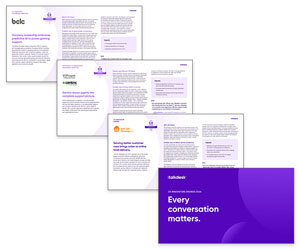At Sprinklr’s CX-Wise ’24 last week, experts shared insights on how AI is reshaping customer experience, particularly in contact centres.
Call Centre Helper presents the key highlights from the three CX-focused sessions at the virtual event, illustrating AI’s role in empowering front-office teams, providing unparalleled customer insights, and driving the future of CX.
Navigating the Intelligence Revolution
The Future of CX session, anchored by Sudhir Rajagopal, explored how businesses are navigating the “intelligence revolution” in CX. Rajagopal noted that the expansion of data has created a significant challenge for companies, with 30% of CX executives citing data complexity as a critical issue.
“We find ourselves almost at the centre of a market that is in the middle of an intelligence revolution,” he explained. The increasing volume and complexity of data are driving the need for AI to streamline customer interactions and create more personalized experiences.
Buddy Waddington of Sprinklr pointed out that AI’s ability to increase the speed from “insight to action” is transformative for brands. AI can derive insights faster and apply them to customer interactions more efficiently.
However, CX expert Colin Shaw cautioned businesses not to get swept up in the AI hype. He highlighted the importance of managing customer expectations and ensuring that AI genuinely enhances customer experiences rather than simply adding complexity.
The session also touched on workforce concerns, with panellist Dan Gingiss raising a key issue: contact centre agents fear AI could replace their jobs.
He emphasized the need to use AI to support agents rather than displace them. “We have to remember the human element,” Gingiss said, noting that agents should be empowered by AI tools that provide real-time insights, allowing them to focus on high-level, empathetic customer service.
Harmonious Chaos
The Future of Front Office Teams, led by CX expert Shep Hyken, centred around the evolving role of contact centre agents in an AI-driven environment.
Hyken introduced the concept of “harmonious chaos” to describe the complex nature of contact centre work, where agents must navigate multiple systems and screens.
AI, he explained, can simplify these processes by automating routine tasks and providing agents with real-time data. “AI can supplement and support the agent in a way that gives them an incredible advantage,” Hyken said.
Annette Franz of CX Journey elaborated on this, explaining that agents who use AI tools experience higher productivity and job satisfaction.
“The day in the life of an agent that uses AI is very different,” Franz remarked. By automating call summaries, analysing customer data, and assisting with insights, AI helps agents focus on delivering better service for complex customer issues.
Darren Randall of Bupa shared a real-world application, explaining how Sprinklr’s agent assist tools have improved both efficiency and employee satisfaction at Bupa.
“There has been a significant increase in agent happiness just by making their lives easy by putting everything in one platform,” Randall said. Tools like automated quality assurance and AI-driven suggestions have made agents’ work more streamlined and effective.
Dan Gingiss also discussed how generative AI has evolved to make customer interactions more natural. Unlike the early chatbots, which often sounded robotic, generative AI has allowed for more conversational and human-like interactions.
Gingiss noted that this development is a game changer for both customers and agents, enhancing engagement on both sides.
Tackling the Data Dilemma
The third and final session, The Future of Contact Centre Intelligence, led by Forrester’s Brandon Purcell, tackled the challenge of data in the age of AI.
While AI offers powerful tools for enhancing customer insights, Purcell noted that “generative AI is making the data problem more pronounced” due to its reliance on clean, trustworthy data.
To maximize the value of AI, Purcell urged businesses to invest in data governance and analytics training, ensuring that employees are equipped to handle AI-generated insights.
Laura Burns of L’Oréal shared how her company uses AI to navigate the complexities of multichannel customer communication. With customers contacting L’Oréal for over 560 different reasons, AI helps the company identify which conversations require engagement and which can be dismissed as noise.
Burns also highlighted the value of AI-driven intent detection, which ensures that customer queries are routed to the appropriate experts. This approach allows L’Oréal agents to focus on providing personalized service rather than spending time on routine processes.
Annette Franz emphasized that AI’s success is dependent on a company’s data strategy and customer-centric culture. “Your culture has to be data-driven,” Franz said, urging businesses to create a solid data governance framework and engage all stakeholders in the process.
She also pointed out the importance of making insights available across the organization to ensure a unified approach to customer engagement.
Michelle Crose of Sprinklr discussed how predictive analytics, powered by AI, is transforming customer service by identifying upsell and cross-sell opportunities.
“Gen-AI led predictive analytics can drive growth by identifying cross-sell and upsell opportunities to drive revenue,” Crose said, underscoring how AI can directly impact the bottom line by anticipating customer needs.
Words to the Wise
The discussions at CX-Wise made it clear that AI is a critical enabler in modernizing customer service. From automating routine tasks to providing real-time insights, AI empowers contact centre agents and improves customer engagement.
However, as Shep Hyken warned, there is a delicate balance between human touch and technology: “You can’t go too far one way or the other.”
Businesses that succeed in implementing AI will be those that not only invest in the right technology but also in data governance and employee training.
AI’s potential lies not in replacing human interaction but in enhancing it, making the future of customer experience more personalized, efficient, and responsive to customer needs.
Author: James Groves
Reviewed by: Xander Freeman
Published On: 16th Sep 2024 - Last modified: 17th Sep 2024
Read more about - Latest News, Artificial Intelligence, Customer Service, Shep Hyken, Sprinklr









































